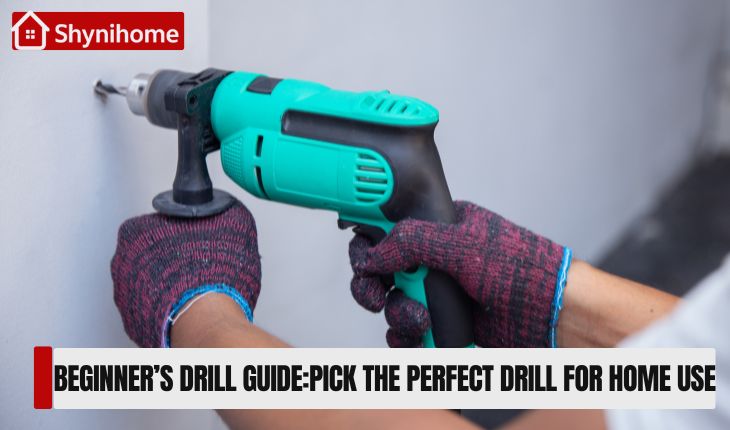
Whether you’re hanging shelves, assembling furniture, or tackling a DIY renovation, a drill is one of the most essential tools in your home toolkit.
But with so many options out there, how do you pick the right one? This drill guide for homeowners and beginners breaks it down simply.
Table of Contents
Toggle🔍 Why the Right Drill Matters

The wrong drill can make tasks harder, cause damage, or even pose safety risks. The right drill, on the other hand, makes projects faster, easier, and more enjoyable. So before you buy, let’s go through the most important factors.
👉 Also Read: DIY Tools 101: A Beginner’s Guide to Home Improvement
🧰 1. Know the Types of Drills
✅ Cordless Drill (Battery-Powered)
- Best for: Everyday home use
- Pros: Portable, easy to use, no cords
- Cons: Battery may run out mid-project
✅ Corded Drill (Plug-In)
- Best for: Long tasks or heavy-duty work
- Pros: More power, no battery limits
- Cons: Less portable, requires power outlet
✅ Hammer Drill
- Best for: Drilling into concrete or brick
- Pros: High-impact force
- Cons: Heavier, overkill for simple tasks
✅ Impact Driver
- Best for: Driving screws into tough surfaces
- Pros: High torque, compact
- Cons: Not ideal for drilling holes
⚙️ 2. Consider These Key Features
🔋 Battery Voltage (Cordless Drills)
- 12V: Lightweight and great for light-duty work
- 18V–20V: Perfect for most home DIY tasks
- 24V+: Heavy-duty projects
⚡ Motor Power (Corded Drills)
- Look for 5–8 amps for home use
🔄 Speed Settings
- Dual-speed drills are ideal
- Low speed = driving screws
- High speed = drilling holes
🔁 Clutch Settings
- Helps avoid overdriving screws
- More settings = more control
🔩 Chuck Size
- Most common: 3/8 inch
- Accepts most standard drill bits
- ½ inch chucks are better for larger bits
🧠 3. Match the Drill to the Project
| Project Type | Recommended Drill Type |
|---|---|
| Hanging photos/shelves | Cordless 12V or 18V drill |
| Furniture assembly | Cordless with clutch |
| Wall mounting (TV, cabinets) | Corded or 20V cordless |
| Masonry or concrete walls | Hammer drill |
| Tight or small spaces | Compact impact driver |
🛡️ 4. Choose a Trusted Brand
Some reliable drill brands include:
- DeWalt
- Makita
- Bosch
- Black+Decker (budget-friendly)
- Milwaukee
📦 5. Don’t Forget the Accessories
To make the most of your drill, consider:
- Drill bit set (wood, metal, masonry bits)
- Extra battery pack (for cordless models)
- Storage case or tool bag
- Screwdriver bit set
✅ Quick Buying Tips
- For Beginners: Start with an 18V cordless drill
- For Occasional Use: Go with budget-friendly models
- For Frequent DIYers: Invest in a drill/driver combo set
- For Heavy Work: Choose a corded or hammer drill
👉 Also Read: Wood Types You Should Know Before Building Anything
📝 Final Thoughts
This drill guide isn’t just for choosing a drill—it’s about choosing the right tool for the right job. Whether you’re a beginner or building your own workshop, the right drill can make all the difference in your home improvement journey.
Remember: Invest smartly and always wear safety gear while using power tools.
